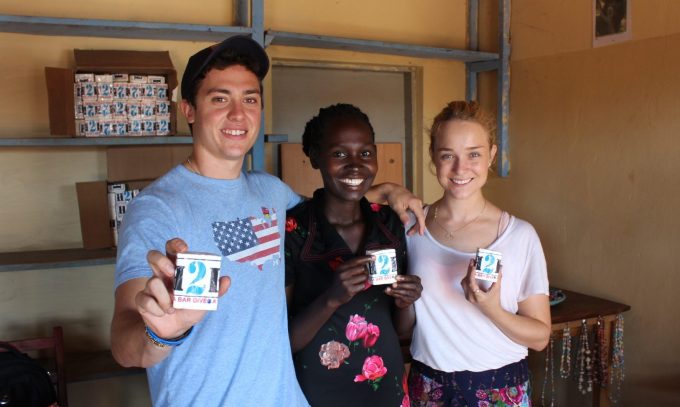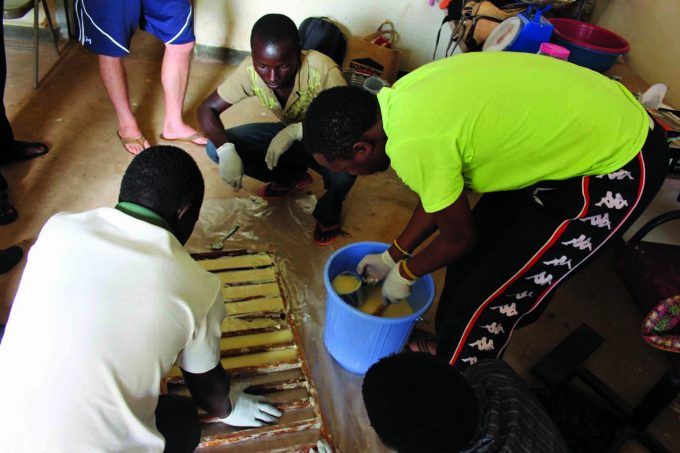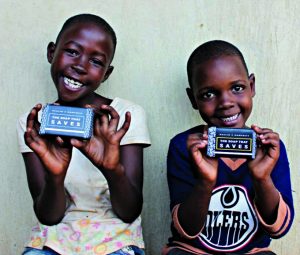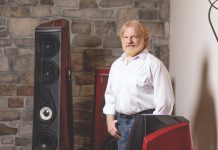John Cefalu, a 21-year-old entrepreneur, is changing lives one bar of soap at a time.

By Ashley Burnett
Health 2 Humanity founder and Newport Beach resident John Cefalu’s story is all about random connections. It was a random connection—a family friend—that first led him to Kenya, where he volunteered at an orphanage. Spurred by what he deemed selfishness, Cefalu went only to bolster his resume, but instead found his life’s work in Africa, where he realized that the lack of hygienic solutions that afflicted many areas of the continent led to easily preventable health problems, like rashes, skin diseases and irritation.
With newfound purpose, Cefalu enrolled in Chapman University and enlisted his friends to help him make soap out of his dorm room. But what started out as a simple soap-making enterprise has since morphed into a nontraditional nonprofit called Health 2 Humanity (H2H) that focuses on sustainability and empowering entrepreneurs all over Africa. Today, the soap is sold online in the U.S. with profits benefitting the nonprofit, while the organization also helps people in African countries to begin making and selling soap in their communities.
A Clean Start
It was a meeting with his high school counselor in South Lake Tahoe, Calif., that initially set Cefalu on the path to volunteerism. After checking in with his counselor to see where he stood in terms of college applications, he received startling news. “I thought I was all good with my resume and my GPA, with my athletics and my leadership stuff, and [the counselor] was like, ‘Hey, you have nothing for any sort of volunteerism. You haven’t done anything outside of the scope of yourself that’s going to get you into any of those elite colleges.’ ”
After speaking with his counselor, Cefalu began walking dogs for an animal shelter and helping out with the homeless, but neither inspired a real sense of altruism in him. “It wasn’t making a huge difference,” Cefalu says. “It was just there.”
Later, he got a call from a family friend asking for Cefalu’s help with his own nonprofit venture, which entailed a 2012 trip to volunteer in Africa. “I said ‘yes,’ and as soon as I hung up the phone, it was … an immediate celebration and kind of excitement,” Cefalu says. “Not for the right reasons, not because I was going to help people in a developing nation, but because I had found that ticket to boost my resume. So I mean, even at that point, it was still [about] ulterior motives.”

These ulterior motives and self-labeled selfishness soon gave way to a true sense of volunteerism. “It was an experience I’ll never forget, just in the sense that I got to live in an orphanage for two weeks in Kenya and experience what they experience, hear their stories and see how happy they were with what little they had,” Cefalu says. “I mean, these orphans are … affected by HIV and AIDS, their parents died in super-impoverished conditions, and they all got thrust in this position they didn’t really want to be in. But they’re still so incredibly happy just to be alive, just to be a part of this whole thing.”
Beyond their optimism, Cefalu also noticed that many were lacking access to basic hygienic products like soap. “We saw that the kids [in Kenya] … would just go to school simply because school provided them with a restroom and it provided them with a meal for the day,” Cefalu explains. “And if they didn’t reach a certain hygiene standard, if their clothes were tattered or anything along those lines, they actually got turned away from school. It was something that could easily be prevented, but no one was doing anything about it.”
Upon his return to California, Cefalu realized he wanted to do something about what he had seen in Kenya. “My whole perspective changed on everything and I realized exactly what I wanted to do,” he says. “I wanted to go back. I needed to go back in a way that wasn’t just … [in] an innocent bystander role.”
Success with Soap
Cefalu’s solution to becoming more than a bystander was simple: It was time to make soap. He came up with a model for soap production and enlisted his friends at Chapman University, driving around all of Southern California looking for suppliers to create a product that he could sell to help train entrepreneurs in developing nations.

“We started to do something we knew nothing about, in a place that wasn’t equipped to do it and, after three or four months of failed attempts, and bad recipes and bad chemical reactions … we finally came up with a bar of soap that we were proud of,” Cefalu says. “… We started selling the soap, and the sales of the soap go into a fund that helps us train these entrepreneurs in developing nations—these people who have never had jobs [like this] before—to make their own soap, to run their own business, to donate back into their community.”
In fact, all of the revenue that comes from H2H selling its soap online in the U.S. is funneled into the organization to continue training entrepreneurs and building new locations, as well as to run Health 2 Humanity Academy, which teaches essential business skills, even those as basic as operating Microsoft software. These entrepreneurs, in turn, help their local communities by donating bars of soap to local orphanages.
H2H has created 12 locations in several African countries, including Uganda, Kenya and Ghana. The nonprofit works with local partners to help entrepreneurs set up their own soap shops, which has led to the generation of 22 jobs overall, with six employees going on to receive full scholarships to colleges thanks to their efforts. These employees are making more than they would at typical jobs in their home countries, and exceeding the minimum wage.
Overall, the nonprofit has already made a tremendous impact. For example, H2H entrepreneur Hezron Njeri’s life has changed significantly since partnering up with the organization.

“… Health 2 Humanity has taught me … how to build a soul and give hope to people,” says Njeri, who lives in Uganda. “Hygiene has been improved and … [the] number of children who visit the hospital has reduced drastically since they have access to the soap.”
It was important to Cefalu that all of the entrepreneurs’ success was based on their own efforts in order to establish a nonprofit that was not about giving, but sustainability. “This is not us giving them a salary, this is not us holding their hand the whole way,” Cefalu says. “This is their own willpower, their own perseverance creating a sustainable venture that’s keeping them going.”
It’s part of H2H’s philosophy of the “fight against giving”—the traditional way that nongovernmental organizations (NGOs) help out developing nations. “You see a lot of giving, you see a lot of throwing money at issues hoping it’ll create a change,” Cefalu says. “You see a lot of tangible goods given hoping it’ll make a change. And they’re all short-term fixes. They all look fantastic for … the first year. But as soon as that year is up, as soon as that temporary bandage is ripped away, you can see that not only has the wound not healed, it’s potentially gotten worse. Because now, not only are they used to having whatever … they’re getting, but [now] they’re dependent on it, they’re used to it, and now they’ve been thrust into a life that they’ll never be able to get again.”

Looking Ahead
Cefalu recently went on a trip to Uganda, where he set up H2H’s 12th location and even met with a top-ranking politician to discuss the poor performance of NGOs in the area that rely more on giving than on actually building up the community.
The company is also celebrating getting its nonprofit status approved this past June. “[Now] we can really push forward with donations on the nonprofit side, [and] our product on the for-profit side is finally done,” Cefalu says. In fact, H2H’s soap became available for purchase at the end of June. The bars of soap can be purchased via the organization’s website and come in four different varieties: lemon, lavender, peppermint and unscented. All of them are manufactured in Concord, Calif., and are available as a one-time purchase or through a monthly subscription.
But beyond that, Cefalu just wants to keep developing the businesses and concentrate on Africa before moving on to other potential locations. “We really want to focus in on where we are before we continue to expand,” Cefalu says, although he notes that South America might be an option in the future.
Cefalu hopes that his charity will inspire others to become a part of the cause, whether that means buying a bar of soap or accompanying H2H on one of its many trips to Africa to start up new businesses. At the very least, he hopes his story will inspire others to look at the world and ask how they can help it.
“Nothing you do is too small,” Cefalu says. “Anything you do on a daily basis for others is noticed. Even [if we’d only done] one trip, with one single person, it would have been impactful.”
~ All photos courtesy of Health 2 Humanity




